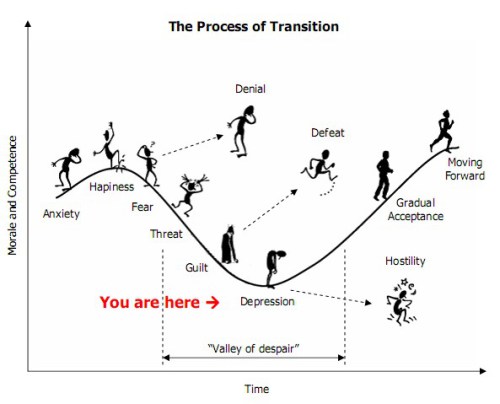
We’re all busy. The last thing we want is change. It’ll take time to adjust to. Why can’t things be the way they just are? If it ain’t broke, don’t fix it.
Except maybe it is broken. And maybe we need to change, because staying the same is often a way of failing over time.
The problem with change is that it’s hard. Some of what has to happen is uncharted.

Worst than that, there’s the bit that happens after the change starts to take root. The above graph of feelings also correlates with the amount of clarity and certainty there is around what the process is right now.
Because changing breaks things. It breaks them a lot. The old ways don’t work anymore. The new ways aren’t clear, don’t quite work yet, aren’t ready, or seem a lot harder than things used to be.
In the absence of the right sort of leadership, people regress to the familiar, regardless of the change you’re trying to make.
In larger organisations, it’s even harder. Changes can create or threaten entire departments. Everybody wants to react to the change by shoring up their process. Processes become more siloed, disjoint, complex and arcane. Rather than make things easier, the change appears to make things harder.
Thus pops up a phenomenon I’ve seen in a few situations.
I don’t recall who coined this term, but let’s call it the Organisational Antibodies. They react to “someone’s doing something” and their response is to prevent it.
This is problematic if you’re in the process of attempting to deliver a change, a project, or other things into an organisation. Because the thing about this sort of immune response to something happening is that it’s a swarm with no specific coordination. It just happens as a function of the individual parts of the system. Nobody’s making it happen. It just happens. Its response is proportional and opposite to what you’re trying to do.
So… how to fix it.
If you recognise yourself as an antibody in this picture then ask whether you exist to facilitate or prevent the value stream. If you’re an expeditor, then you’re not an antibody. If you’re a preventer, then try to work out how to enable. Because prevention is not the stopping of bad things, is the filtering through of good things. Think of the security guard at the front of the night club making sure the VIPs get in. The business value is the VIPs.
If you’re facing a slew of antibodies then you need to stop provoking the immune response. Come in in disguise. Or put another way, make it easy to be accepted as universally as possible by all shapes of process you hit. Don’t fight every battle just because. Recognise that it’s hard and try to find middle ground. Don’t look like the sort of virus they’ve been given an immune response to.
But all in all, it’s a question for organisation leadership. Is everyone on the same page? Is the organisation organised around value delivery? Are processes expanding or simplifying? Is everyone bought in?
Organisation antibodies are 60% a cultural problem and 40% a process problem. But… sadly… in some extreme cases it’s 90/10.
Recognise when this is happening in your organisation and work together to find a fix. Otherwise everything will be, metaphorically, a fever.